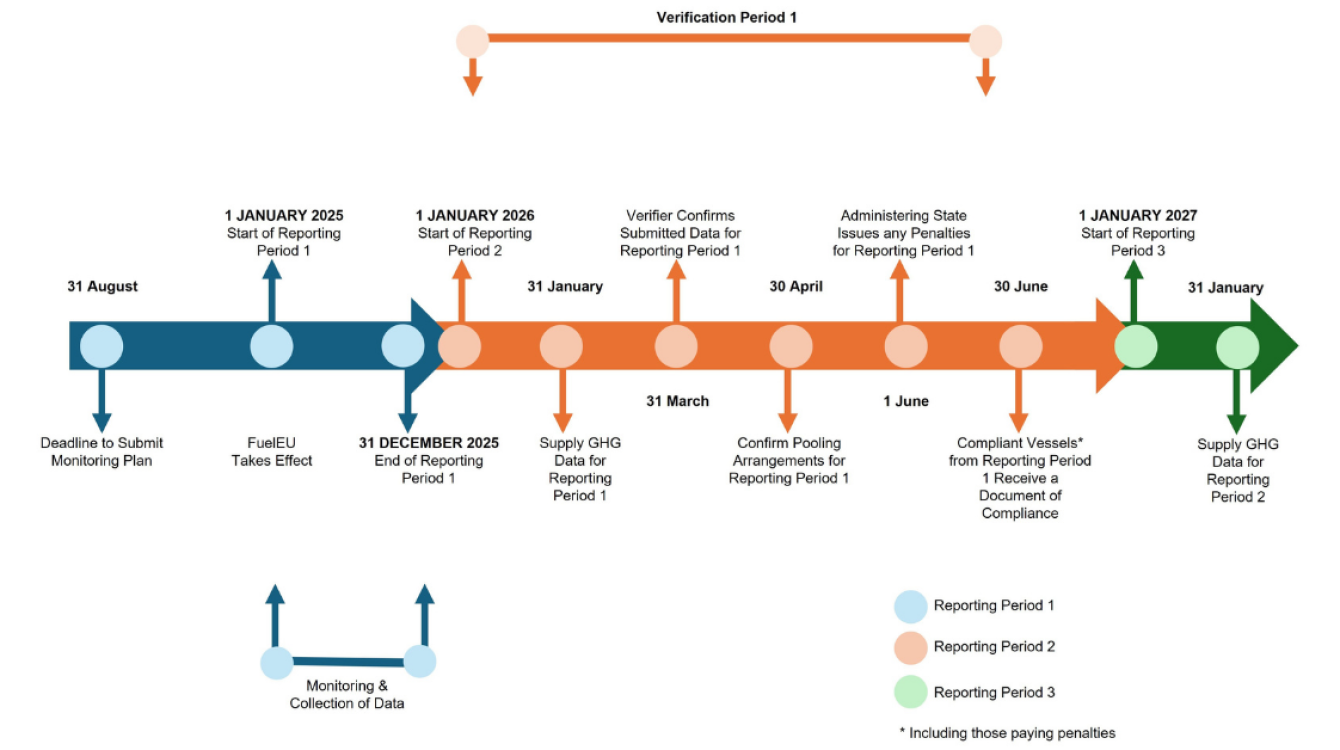
Reed Smith
Published: May 19, 2025
With FuelEU1 having come into force on 1 January 2025, there have been lots of questions raised as to the allocation of responsibilities between shipowners and charterers.
We are currently in the first Reporting Period of the new regime (1 January 2025 to 31 December 2025). During the Reporting Period, the greenhouse gas emissions of a vessel should be tracked and monitored. Verification of the 2025 data will then take place in the 2026 calendar year, the “Verification Period,” after which compliant vessels will receive a FuelEU Document of Compliance.

Unlike EU ETS, where a “shipping company” purchases and surrenders EU Allowances (EUAs) for each tonne of CO2 emitted, FuelEU sets a target for fuel emission intensity which the “company” must seek to meet. Each fuel is given an emission profile reflecting the environmental impact of the fuel on a ‘well-to-wake’ basis – that is, from the point it is extracted from the ground or otherwise captured to when it is burnt onboard the vessel. The Regulation rewards and incentivises the use of renewable or low-carbon fuels.
Who is the “company” under FuelEU?
FuelEU makes the “company”2 responsible for ensuring the vessel is compliant. In practice, that commonly means whoever is the vessel’s Document of Compliance holder will be responsible for ensuring compliance under the Regulation.
In line with the “polluter pays” principle, the “company” may seek to pass responsibility for compliance to its contractual counterparts. In doing so, a counterpart would want to ensure that they are able to utilise the different methods of achieving compliance beyond paying the FuelEU penalty (namely, the ability to use bio- and low carbon fuels, or the ability to pool, bank or borrow).
Parties should therefore consider their charterparty clauses. For time charterparties, BIMCO has produced a FuelEU Time Charter Clause, which we discuss below.
BIMCO’s FuelEU Time Charter Clause
The clause is designed for incorporation into time charter parties and seeks to balance the rights and obligations between charterers and owners.
The “Surcharge”
Subclause (d) envisions a monthly, or per voyage, calculation of the vessel’s aggregate Compliance Balance during the charter period being carried out by owners.
If the vessel is compliant throughout the charter (i.e. at compliance level throughout), then a “Surcharge” would not be payable. However, if the vessel’s aggregate Compliance Balance during the charter period for that month or voyage is in deficit, or has a negative value, subclause (d) provides for charterers to pay a sum to owners, the “Surcharge”. This “Surcharge” is calculated based on owners’ exposure to the payment of the FuelEU penalty and only considers emissions that are part of the charter period, see exclusions at (e).
Whilst subclause (d) sets out the obligation of owners to carry out and share the calculations, the actual payment of the “Surcharge” is dealt with under subclause (f). Under (f), there is optionality for payments to be made either on a monthly or voyage basis. However, it also allows for the parties to negotiate a one-off payment upon redelivery or in early June, whichever is earlier, instead of relying on monthly/voyage accounting. If a one off payment is selected, sub-clause (g), will not be needed.
There are exclusions when calculating the “Surcharge” provided in subclause (e). These exclusions are intended to avoid charterers being impacted, positively or negatively, by actions of owners, or previous charterers. A note of warning that the “multiplier”, which applies “if a ship has a compliance deficit for two consecutive Reporting Periods or more”, will apply to the second year of non-compliance. As such, in order to avoid the negative impact of a previous charterers’ actions, the vessel must not have been in deficit for the previous Reporting Period, not the previous two Reporting Periods.
Liquidated Damages
An optional feature of the BIMCO FuelEU clause for longer charters is subclause (l).
The Regulation provides that a multiplier is added to the penalty for successive years of non-compliance. As a result, owners or future charterers could be left with higher penalties due to the actions of the current charterers.
The parties can, therefore, negotiate an amount by way of liquidated damages that charterers will pay, above the “Surcharge”, if redelivering in deficit, in order to compensate for any such future loss.
Alternative Fuels
The BIMCO FuelEU clause seeks to deal with owners’ concerns as to their compliance obligations whilst chartering the vessel, but the clause also seeks to provide charterers with the opportunity to ensure compliance beyond the payment of the “Surcharge”.
Subclause (c) gives charterers the option to comply with FuelEU through the supply of alternative fuels and energy. However, such fuels must still comply with the bunker specifications and any other clauses contained in the charterparty, hence the need to update bunker clauses.
Banking and Pooling
If a vessel is left with a Compliance Balance surplus (i.e. it has performed better than necessary), it is able to bank that surplus to be used at a future date, or it can pool the surplus with other vessels that are in a deficit.
Subclause (i) allows charterers to instruct owners to bank or pool any FuelEU Compliance Balance. However, this right is only available to charterers if the charter period covers a complete FuelEU Reporting Period.
Charterers that will be chartering a vessel for an extended period of time which covers a large majority of, but not a whole calendar year, could consider amending this clause so they can retain that right to bank or pool. On the other hand, if owners have their own pooling arrangements that they want to pursue, then the clause would need amending to protect their right to pool.
Discussions on pooling should take place at the fixing stage to understand whether the vessel is already in a FuelEU pool.
Borrowing
Vessels are permitted to borrow up to 2% of the following year’s Compliance Balance in order to comply in the current Reporting Period.
Subclause (j) gives charterers the right to instruct owners to borrow from the following Reporting Period. However, this is limited to situations where the charter period covers at least two consecutive Reporting Periods (i.e. two complete calendar years), and charterers may only request this if there is at least one full Reporting Period left in the charter period.
If charterers are to borrow from a future Reporting Period (therefore reducing the Compliance Balance available for the next year), under the clause, charterers would be responsible for complying with that reduced balance the following year.
Positive Compliance Balance
A positive Compliance Balance will likely have financial value to owners. The ability to bank makes it easier to comply in subsequent years, so there is a lower likelihood of being liable to pay the FuelEU penalty. Likewise, owners of vessels with a Compliance Balance surplus would not pool out of benevolence – a market for the pooling of vessels is emerging.
Therefore, if a vessel achieves a Compliance Balance surplus as a result of charterers’ actions, such as by using low carbon fuels, and this remains with the vessel without being committed to a pool by charterers, then charterers should be rewarded financially for this.
Subclause (m) of the BIMCO FuelEU clause seeks to address this by allowing owners and charterers to predetermine a fixed amount to be paid for every tonne of CO2 equivalent of positive Compliance Balance at the end of the charter period.
It is important to fill in this clause, failing which, the clause does not apply.
Other contractual considerations
The FuelEU compliance system can be complex and charterparties should be reviewed to provide for compliance. However, it is not just charterparties that will need to be reviewed in the light of FuelEU. The following contracts should also be considered:
Ship management Agreements – As between owners and a ship manager, responsibility for compliance with FuelEU should be addressed under the ship management agreement. Bimco has produced a clause for ship management agreements - FuelEU Maritime Clause for SHIPMAN 2024.
Sale and Purchase Agreements – As between sellers and buyers, there needs to be accounting for any compliance deficit or surplus. Importantly for owners and managers to note is that whoever is the vessel’s “company” on 31 December of any Reporting Period, notwithstanding a change of ownership thereafter, is responsible for compliance for the relevant Reporting Period.
Bunker Agreements – Correct documentation is key, as FuelEU requires certain details are provided with bunker delivery notes and that these delivery notes are retained, especially when needed to demonstrate a cleaner fuel has been used, otherwise it will be treated as a fossil fuel. Owners will need to ensure they receive proper and fulsome documentation from their suppliers.
The BIMCO clause is a useful starting point for balancing the responsibilities under FuelEU between owners and charterers. However, as set out above, the clause does need consideration and potential amendment prior to being inserted into a charterparty. Owners will need to consider their approach to achieving compliance before giving charterers the right to pool, and the optional clauses also require consideration.
1 Regulation (EU) 2023/1805
2 “Company” is defined under the Regulation as “the shipowner or any other organisation or person such as the manager or the bareboat charterer, which has assumed the responsibility for the operation of the ship from the shipowner and has agreed to take over all the duties and responsibilities imposed by the International Management Code for the Safe Operation of Ships and for Pollution Prevention”.



